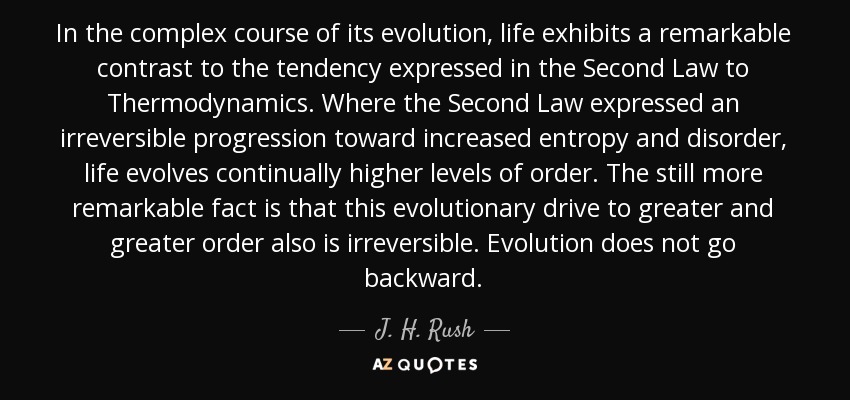

"directional and essentially irreversible process occurring in time, which in its course gives rise to an increase of variety and an increasingly high level of organization in its products." The famous evolutionist Julian Huxley has defined evolution as a None the less, the essential claim of evolution is that random change and natural selection do make simple things spontaneously transform into more complex things without recourse to intelligent purpose or design. Rather, all complex machines and devices with which we are familiar are the result of intelligent design and manufacture. Random changes in anything simply do not produce higher levels of organization and complexity. Things left to chance just don't get done. Perhaps the reason so many people continue to reject the notion of evolution is that it seems contrary to ordinary experience. There Ought To Be A Law Against Evolution.

Creationists hold to His promise that he will do that someday, evolutionists have no such hope. Evolutionists call it the "big bang " creationists call it the "big beginning." It also indicates that unless God intervenes, the universe is doomed to total randomness, destruction and death. Since the second law is irreversible, it begs for a time when the universe was wound up and created.

Creationists speculate that at this time, the second law of thermodynamics will be repealed, and time will be no more. The Bible talks about a time where the conditions of Eden will be restored to the earth. There is no mechanism proposed for new, improved genes producing new species. These scenarios result in useless proteins and less efficient organisms. Mutations occur when the cell replaces damaged genes as a result of a repair process and a mistake occurs in the repair, or when genes are swapped into new sequences. This would take the introduction of new information in the forms of new genes. The problem is that the origin of new species is not observed. One difficulty this presents for evolutionists is that we observe the results of the second law of thermodynamics in the extinction of animals all the time. It talks about a creation designed originally to last forever, but altered and cursed by the introduction of sin. The Biblical point of view provides an explanation that fits perfectly. Time is an enemy to order, and if the earth were billions of years old as evolutionists claim, we would expect it to be in a total state of disorder. This totally contradicts evolution, and the problem gets worse as time passes. The addition of more energy compounds the problem, since it usually speeds the breakdown of order. An evolution model would have to explain a mechanism that converts energy from an outside source into information and complexity.Įvolutionists have been scrambling for an explanation that makes sense.

Evolution appears to be in direct violation of the second law of thermodynamics, since it requires change from simple to complex. The second law observes that matter and energy continuously and spontaneously proceeds from a state of order to disorder.Īs scientific laws, there are no known exceptions that have ever been observed. The first law of thermodynamics states that matter and energy cannot be created or destroyed, they just change forms. Two scientific laws provide a test for evolution. The author of this article may or may not agree with the views expressed on those pages, or anything else on this site.Īlso See Choose Life That You Might Live. However while the text is part of the original article, the links are not. Please Note: Each coloured link within the article will lead you to a related topic on a different page of this site. Index To Other Beliefs > Index To Articles on Evolution > Second Law of Thermodynamics


 0 kommentar(er)
0 kommentar(er)
